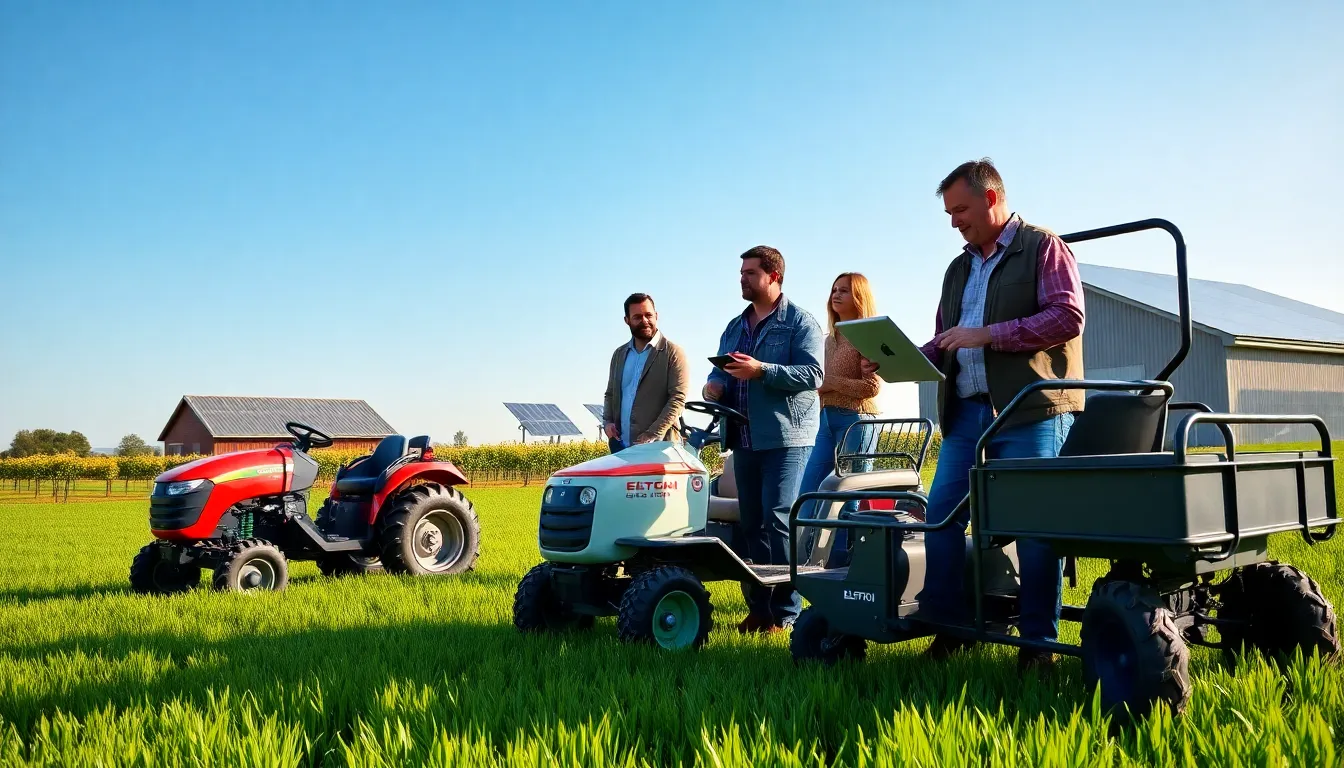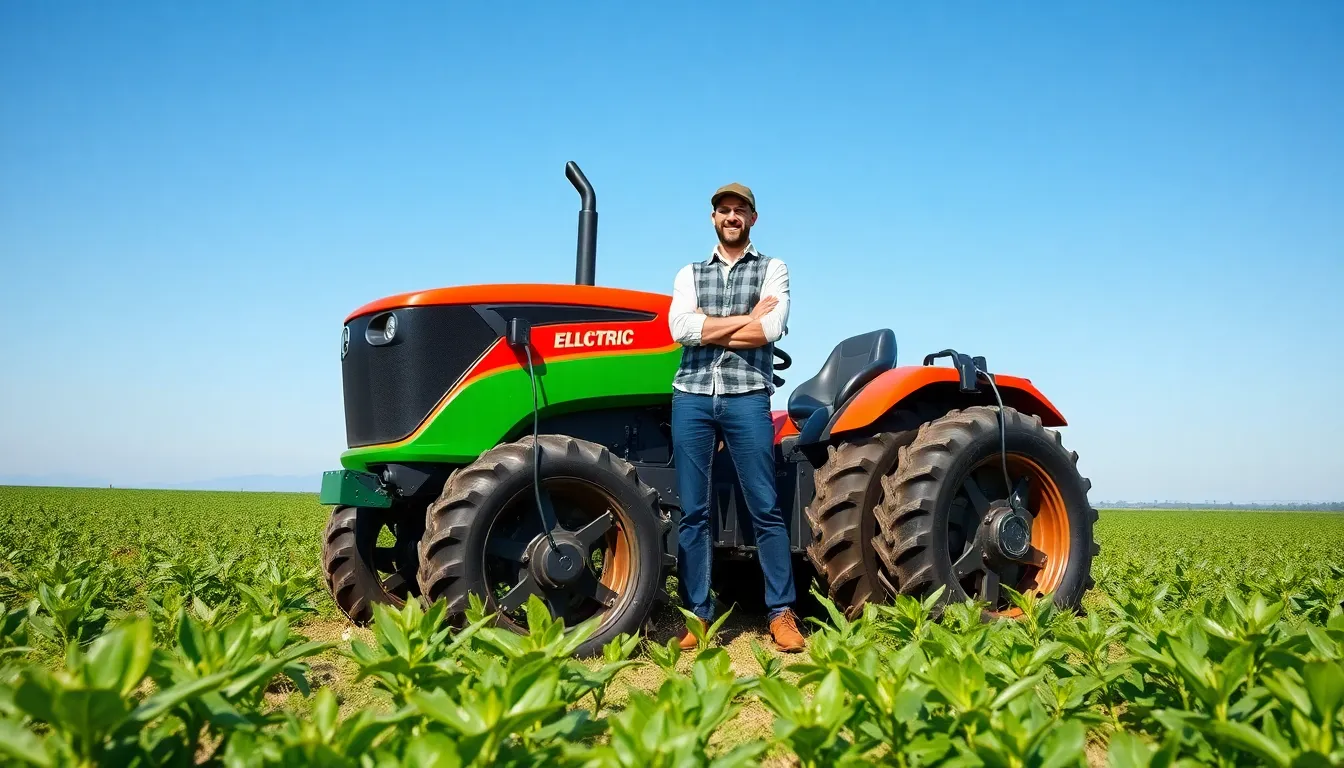Imagine a world where tractors hum quietly instead of roaring like a lion. Well, that world is upon us thanks to electric farm vehicles. As farmers face mounting pressure to be eco-friendly, these modern marvels are revolutionizing agriculture. Gone are the days when farming meant battling pollution and rising fuel costs. The shift to electric is not just a trend, it’s a sustainable solution that’s taking root in fields across the globe. Are you ready to dig into how these vehicles are changing the agricultural landscape for the better?
Table of Contents
ToggleOverview of Electric Farm Vehicles

Electric farm vehicles are transforming the way farms operate, proving that agriculture can be both efficient and environmentally friendly. These vehicles come in various forms, from tractors to utility vehicles, all designed to meet the unique demands of modern farming. Unlike traditional diesel machines, electric farm vehicles prioritize sustainability, powered by rechargeable batteries and often utilizing renewable energy sources.
Farmers are drawn to these technologies not just by eco-consciousness but also by performance improvements. Faster acceleration and enhanced torque allow electric vehicles to execute multiple tasks effortlessly, while reducing the environmental footprint of farming operations. In this section, we will explore the features and functionalities that make electric vehicles a powerful choice in today’s agriculture.
Benefits of Electric Farm Vehicles
Opting for electric farm vehicles offers a plethora of benefits that go beyond just reducing emissions. For starters, these vehicles significantly lower operational costs. Imagine slashing fuel expenses while simultaneously decreasing maintenance because electric machines typically have fewer moving parts. This not only saves money but translates to more time for farmers to focus on what really matters: growing crops.
Also, electric farm vehicles contribute to cleaner air and a healthier environment. Pollutants that once filled the air with every turn are now replaced with silent efficiency. This is particularly beneficial in areas where air quality is a concern.
Also, electric vehicles often come equipped with smart technology that optimizes farming operations. From navigation systems to precision farming tools, these innovations help farmers increase productivity and manage their resources better. In essence, transitioning to electric farm vehicles isn’t just a decision for the environment but a savvy business move.
Types of Electric Farm Vehicles
The landscape of electric farm vehicles is diverse, offering solutions for a variety of farming needs. Here are some common types:
- Electric Tractors: These heavy hitters can handle the most demanding tasks on the farm. With different models available for various scales of operation, farmers have options ranging from small compact models to larger, more robust tractors.
- Electric Utility Vehicles: Ideal for transporting goods around the farm, these vehicles combine speed with agility. Farmers can use them to haul equipment or check on crops with ease.
- Electric Harvesters: These specialized machines are designed for efficient crop picking, minimizing damage to plants while maximizing yield.
- Electric Sprayers: Offering better precision and less waste, electric sprayers ensure that farmers apply just the right amount of chemicals, promoting sustainable farming practices.
By understanding the range available, farmers can choose the right vehicle for their specific challenges.
Challenges in Adopting Electric Farm Vehicles
While the shift to electric farm vehicles presents exciting opportunities, several challenges hinder widespread adoption. The initial cost of electric vehicles can be daunting, even though long-term savings often offset this investment. Many farmers remain concerned about the capital required to make a switch.
Besides, charging infrastructure poses another obstacle. Unlike traditional gas stations, readily accessible charging stations aren’t yet ubiquitous in rural areas. Farmers need to consider where and how they will charge their vehicles, which adds an extra layer of complexity.
Battery life and range are also critical issues. Although advancements continue to be made, some farmers fear that electric vehicles may not have the stamina for extended workdays, especially in larger farming operations. Addressing these challenges will eventually be essential for the broader acceptance of electric farm vehicles in agriculture.
Technological Innovations in Electric Farm Vehicles
Electric farm vehicles are at the forefront of technological innovation, and these advancements significantly enhance their functionality. For example, manufacturers are focusing on developing batteries with longer life and shorter charging times, making them more viable for daily farming tasks.
Plus, smart technology integration has taken electric farm vehicles to another level. Vehicles now feature data analytics capabilities that provide real-time feedback on performance, enabling farmers to make informed decisions that enhance productivity. Consider how satellite imagery paired with electric vehicles can streamline farm management, offering insights that were previously reserved for the highest-tech agribusinesses.
Also, the rise of automation and robotics in farming has promising implications for electric vehicles. Imagine fully automated tractors that can operate without human intervention, working in perfect harmony with all aspects of a farm’s operation.
Case Studies: Successful Implementations of Electric Farm Vehicles
There are numerous stories of farmers who embraced electric farm vehicles and achieved remarkable results. For instance, a vineyard in California switched from diesel to electric tractors and reported a 40% reduction in operational costs over two years. The vineyard not only saved money but also increased its sustainability image, attracting eco-conscious consumers.
Another notable case is a Midwest dairy farm that integrated electric utility vehicles to streamline its operations. The farm reported improved efficiency and significant time savings in transportation, allowing farmers to focus more on animal care and crop production.
These case studies demonstrate that embracing electric vehicles isn’t just about being trendy. It’s about making strategic choices that align with the future of farming.



